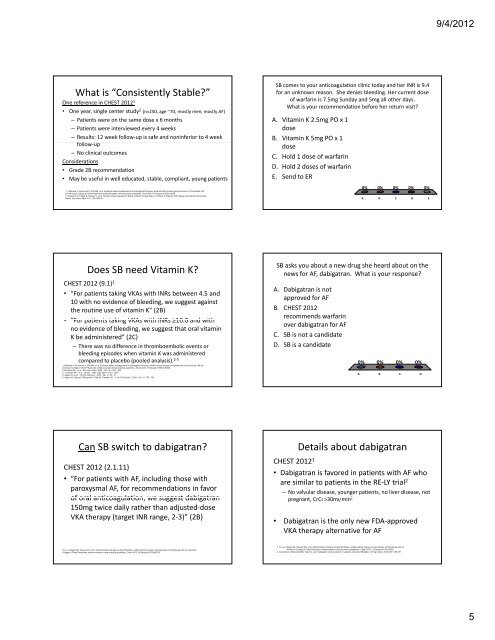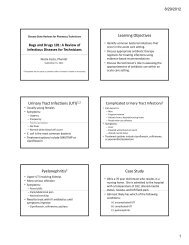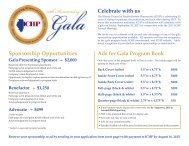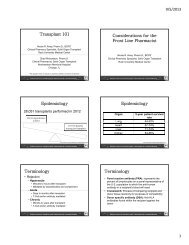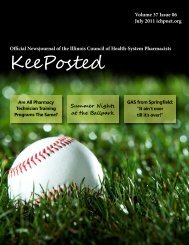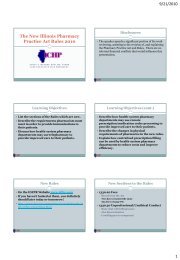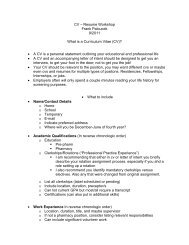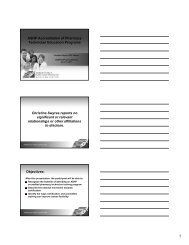Presentation Outline ICHP Annual Meeting September 13-15
Presentation Outline ICHP Annual Meeting September 13-15
Presentation Outline ICHP Annual Meeting September 13-15
Create successful ePaper yourself
Turn your PDF publications into a flip-book with our unique Google optimized e-Paper software.
What is “Consistently Stable?”<br />
One reference in CHEST 2012 1<br />
• One year, single center study 2 (n=250, age ~70, mostly men, mostly AF)<br />
– Patients were on the same dose x 6 months<br />
– Patients were interviewed every 4 weeks<br />
– Results: 12 week follow‐up is safe and noninferior to 4 week<br />
ffollow‐up ll<br />
– No clinical outcomes<br />
Considerations<br />
• Grade 2B recommendation<br />
• May be useful in well educated, stable, compliant, young patients<br />
1. Holbrook A, Schulman S, Witt DM; et al. Evidence-based management of anticoagulant therapy: antithrombotic therapy and prevention of thrombosis, 9th<br />
ed: American College of Chest Physicians evidence-based clinical practice guidelines, Chest 2012 1412suppl e<strong>15</strong>2S-e184S<br />
2. Schulman S, Parpia S, Stewart C, et al. Warfarin Dose Assessment Every 4 Weeks Versus Every 12 Weeks in Patients With Stable International Normalized<br />
Ratios. Ann Intern Med 2011; <strong>15</strong>5: 653-59<br />
Does SB need Vitamin K?<br />
CHEST 2012 (9.1) 1<br />
• “For patients taking VKAs with INRs between 4.5 and<br />
10 with no evidence of bleeding, we suggest against<br />
the routine use of vitamin K” (2B)<br />
• • “For For patients taking VKAs with INRs ≥10.0 ≥10 0 and with<br />
no evidence of bleeding, we suggest that oral vitamin<br />
K be administered” (2C)<br />
– There was no difference in thromboembolic events or<br />
bleeding episodes when vitamin K was administered<br />
compared to placebo (pooled analysis). 2‐5<br />
1.Holbrook A, Schulman S, Witt DM; et al. Evidence-based management of anticoagulant therapy: antithrombotic therapy and prevention of thrombosis, 9th ed:<br />
American College of Chest Physicians evidence-based clinical practice guidelines, Chest 2012 1412suppl e<strong>15</strong>2S-e184S2.<br />
2.Crowther MA , et al . Ann Intern Med .2009 ; <strong>15</strong>0 ( 5 ): 293 - 300<br />
3. Crowther MA , et al . Lancet . 2000; 356( 9241): <strong>15</strong>51- <strong>15</strong>53<br />
4. Ageno W, et al . Thromb Haemost . 2002 ; 88 ( 1 ):48 - 51<br />
5. Ageno W, Garcia D, Silingardi M, Galli M, Crowther, M .. J Am Coll Cardiol . 2005 ; 46 ( 4 ): 730 - 742<br />
Can SB switch to dabigatran?<br />
CHEST 2012 (2.1.11)<br />
• “For patients with AF, including those with<br />
paroxysmal AF, for recommendations in favor<br />
of oral anticoagulation, anticoagulation we suggest dabigatran<br />
<strong>15</strong>0mg twice daily rather than adjusted‐dose<br />
VKA therapy (target INR range, 2‐3)” (2B)<br />
You JJ, Singer DE, Howard PA; et al. Antithrombotic therapy for atrial fibrillation: antithrombotic therapy and prevention of thrombosis, 9th ed: American<br />
College of Chest Physicians evidence-based clinical practice guidelines, Chest 2012 1412suppl e531S-e575S<br />
SB comes to your anticoagulation clinic today and her INR is 9.4<br />
for an unknown reason. She denies bleeding. Her current dose<br />
of warfarin is 7.5mg Sunday and 5mg all other days.<br />
What is your recommendation before her return visit?<br />
A. Vitamin K 2.5mg PO x 1<br />
dose<br />
B. Vitamin K 5mg PO x 1<br />
dose<br />
C. Hold 1 dose of warfarin<br />
D. Hold 2 doses of warfarin<br />
E. Send to ER<br />
0% 0% 0% 0% 0%<br />
A. B. C. D. E.<br />
SB asks you about a new drug she heard about on the<br />
news for AF, dabigatran. What is your response?<br />
A. Dabigatran is not<br />
approved for AF<br />
B. CHEST 2012<br />
recommends warfarin<br />
over dabigatran for AF<br />
C. SB is not a candidate<br />
D. SB is a candidate<br />
0% 0% 0% 0%<br />
A. B. C. D.<br />
Details about dabigatran<br />
CHEST 2012 1<br />
• Dabigatran is favored in patients with AF who<br />
are similar to patients in the RE‐LY trial 2<br />
– No valvular disease, younger patients, no liver disease, not<br />
pregnant, CrCl l >30ml/min l/ 2<br />
• Dabigatran is the only new FDA‐approved<br />
VKA therapy alternative for AF<br />
1. You JJ, Singer DE, Howard PA; et al. Antithrombotic therapy for atrial fibrillation: antithrombotic therapy and prevention of thrombosis, 9th ed:<br />
American College of Chest Physicians evidence-based clinical practice guidelines, Chest 2012 1412suppl e531S-e575S<br />
2. Connolly SJ, Ezekowitz MD, Yusuf S, et al. Dabigatran versus warfarin in patients with atrial fibrillation. N Engl J Med. 2010;361:1<strong>13</strong>9-<strong>15</strong>1<br />
9/4/2012<br />
5


